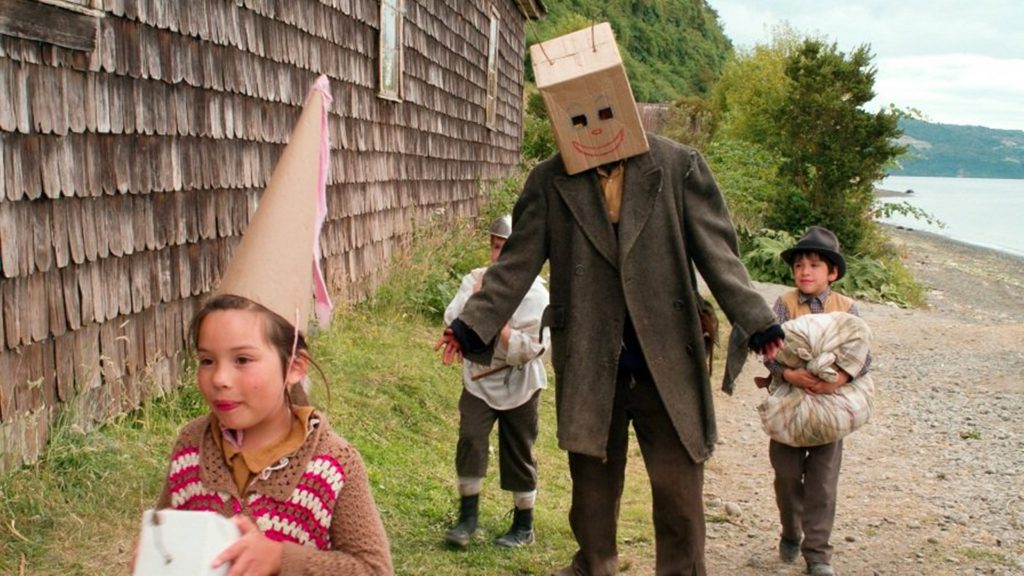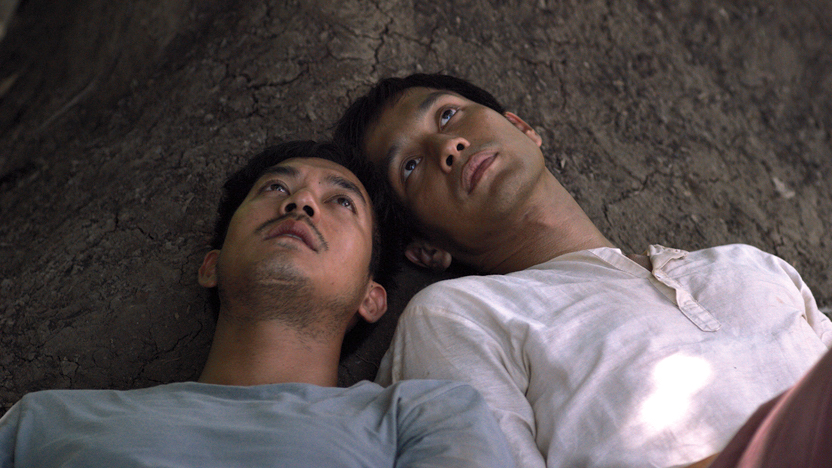by Nathaniel R
 "And Suddenly the Dawn" is the longest film hoping for a foreign Oscar nomination this year at 3 hours and 15 minutes
"And Suddenly the Dawn" is the longest film hoping for a foreign Oscar nomination this year at 3 hours and 15 minutes
We've been digging into the 87 films that are up for the Academy Award in Foreign Language Film. So far we've watched the trailers, talked about female directors, first time filmmakers, and international hunks. Today a collection of scattered trivia regarding the list as well as the LGBTQ films in the running.
LONGEST & SHORTEST
Running times are, we admit, a peculiar TFE obsession but it is what it is. The longest submission this year is Chile's And Suddenly the Dawn at 195 minutes. It's a sprawling fictional biography of a writer returning home after a long absence and takes place in three different time periods of his life: childhood in the 1940s, adulthood in the 1960s/70s, and present day old age. Did their win last season embolden Chile the way directors often get more longwinded the more famous they get? Germany's Never Look Away (just reviewed) and Turkey's The Wild Pear Tree are the only other absurdly long films, each over 3 hours (188 minutes each to be exact). The shortest entries are Costa Rica's university student pregnancy drama Medea (70 minutes) and Lithuania's sports documentary Wonderful Losers (71 minutes) but there are actually quite a few entries that are hovering just below the perfect movie length of 90 minute. In other words, a lot of international filmmakers kept it tight.
 Thailand's Malila: The Farewell Flower
Thailand's Malila: The Farewell Flower
Queer cinema, double-category contenders, and more after the jump...
QUEER CINEMA
There are usually at least a couple of films on the long list with LGBT elements. This year there's more than usual. Seven of the 87 could be considered LGBTQ films, though some are less emphatically queer than others.
 My personal favorites among the queer entries are Israel, Kosovo, and Sweden but Belgium's "Girl" seems the most likely as a future nominee
My personal favorites among the queer entries are Israel, Kosovo, and Sweden but Belgium's "Girl" seems the most likely as a future nominee
- Argentina's El Angel A true crime drama about a pair of thieves. The men won't call it what it is but they're definitely in queer-lust territory and not just gay-for-pay. We discussed this one on the podcast and it's in movie theaters now.
- Belgium's Girl The story of a young trans girl who has been accepted to an elite ballet school. She dreams of being a skilled ballerina but wasn't trained for toe shoes, leading to lots of physical pain and complicated otherness in her new classes. Coming soon to Netflix.
- Israel's The Cakemaker A gay German baker, mourning his married Israeli lover's death, becomes entangled with his lover's family without them knowing why he came to Israel in the first place. Read our interview with the director here.
- Kosovo's The Marriage A woman doesn't realize her fiance loves his best friend in this engaging drama. A controversial film in Kosovo given it contains the country's anti-gay climate.
- Paraguay's The Heiresses This spanish language drama is about an older lesbian starting her life over again when her partner is jailed. The lead actress won the Silver Bear at Berlinale this year and the film is opening in the US in 2019.
- Sweden's Border To reveal why we view it as a queer film would be a spoiler so let's not -- it was tough to review because you don't wanna spoil anything. But it's in theaters right now so GO.
- Thailand's Malila: The Farewell Flower Like The Cakemaker this is about a gay man grieving his lover's death. The director is a trans woman.
WORLD WAR II
There is a reason World War II never stops having movies made about it and it's right there in the name "world"... there are infinite numbers of stories to be told about it from a vast number of countries. World War II doesn't have the dominance it used to have in this category -- surely because the war is receding in time and fewer people are alive who have first hand accounts -- but we still have six flms dealing with the topic, though only half of them are period pieces (the others are contemporary grapplings with the issue in documentary or dramatized form)
 Romania's tough and talky "I do not care if we go down as barbarians" examines wartime atrocities through a modern making a movie lens
Romania's tough and talky "I do not care if we go down as barbarians" examines wartime atrocities through a modern making a movie lens
- Austria's The Waldheim Waltz
- France's Memoir of War
- The Netherland's The Resistance Banker
- Romania's "I do not care if we go down..."
- Russia's Sobibor
- Slovakia's The Interpreter
The bulk of the films submitted are contemporary films but in addition to these WW II films, the other period pieces are set in the 19th century (Singapore's Buffalo Boys), the early 20th century (Hungary's Sunset), the 1930s (China's Hidden Man), the 1950s (Poland's Cold War and South Africa's Sew the Winter to My Skin), the 1960s (Vietnam's The Tailor), the 1970s (Argentina's El Angel, Cambodia's Graves Without a Name, Mexico's Roma, and Uruguay's A Twelve Year Night), and the 1990s (Belarus's Crystal Swan)... in case you're insane and would like to watch them in chronological order.
DOUBLE DIPPING WITH DOCS?
Though the foreign contenders list usually contains one random animated film, no country submitted a cartoon this time. But documentaries were booming as risky non-traditional choices go. Only two documentaries have been nominated in this category in the past (Waltz With Bashir in 2008 and The Missing Picture in 2013) but each year countries seem certain that they'll be the third film on that list. This year there are 9 docs among the 87 films submitted for Foreign Language Film. All of them have been dual-submitted so are also eligible to be nominated in Documentary Feature. But, for what it's worth, no film has ever managed that particular double nomination.
 "Yellow is Forbidden" is a fashion documentary about Chinese designer Guo Pei from a New Zealand director
"Yellow is Forbidden" is a fashion documentary about Chinese designer Guo Pei from a New Zealand director
The documentaries are:
- Austria's The Waldheim Waltz (world war II doc)
- Cambodia's Graves Without a Name (political/war doc). This is definitely one to watch since Oscar did nominate The Missing Picture from this same director on the same overarching topic: the Cambodian genocide during the Khmer Rouge era.
- Ecuador's A Son of Man (father/son journey doc)
- Latvia's To Be Continued (childhood/education doc)
- Lithuania's Wonderful Losers (sports doc)
- New Zealand's Yellow is Forbidden (fashion doc)
- Palestine's Ghost Hunting (political/prison doc)
- Panama's Ruben Blades Is Not My Name (music doc)
- Switzerland's Eldorado (refugee crisis doc)
Speaking of double dipping, nominations wise...
Though any of the foreign contenders which were theatrically released in the US during 2018 will theoretically be eligible in all categories only two seem like strong threats to be nominated somewhere besides foreign film. The submissions most likely to swing a nomination in an additional category this year are Mexico's Roma (reviewed and in a few theaters now to qualify for the Oscars) which seems certain to compete for Best Director and nab at least a few more nominations and Poland's Cold War which is easy to imagine as a Cinematography nominee since it's even more beautiful than Ida by the same team, which was nominated for cinematography and won foreign film.
 Nadine Labaki's "Capernaum" is one of the strongest contenders for a nomination
Nadine Labaki's "Capernaum" is one of the strongest contenders for a nomination
OTHER RECORDS / STATS THAT COULD CHANGE THIS YEAR
FEMALE DIRECTORS.
Missing in the frequent discussion about the lack of female directors represented at the Oscars each year is the matter of the foreign film category. Unlike in the Best Director category, there's a long history of female directors being honored here. Twenty-two films by women have been nominated in the past with three of them winning. For the past three consecutive years one of the five nominees has been directed by a woman (2015's Mustang, 2016's Toni Erdmann, and 2017's On Body and Soul). While there has never been a year with a female dominated shortlist, there have been three separate years wherein two of the five films came from women (1996's A Chef in Love and The Other Side of Sunday, 2002's Nowhere in Africa and Zus & Zo, and 2006's After the Wedding and Water). This year there are 20 female-helmed films in the running and the ones with the most buzz, and thus theoretically positioned to tie this record or one-up it giving this category it's first 50/50 year of female and male directors are Lebanon's Capernaum from Nadine Labaki, Colombia's Birds of Passage (Cristina Gallego co-directing with her husband), and the UK's I Am Not a Witch from Rungano Nyoni.
 MOST NOMS WITHOUT A WIN
MOST NOMS WITHOUT A WIN
Israel (10 nominations) and Mexico (8 nominations) are currently the two countries which have the most nominations without ever winning. Alfonso Cuarón's Roma, the assumed frontrunner for this year's race, could well bring Mexico its first Oscar. If it does Israel will be way out front in this dubious distinction with Belgium (7 nominations to date) as runner-up.
MOST SUBMISSIONS WITHOUT A NOMINATION
South Korea is probably in the best position to escape the dread list of 'most-shunned countries' if the Executive Committee saves Burning (reviewed and podcasted here) and places it on the 9-wide finalist list. That's its best shot at becoming an actual nominee. By the same notion, if well reviewed contenders like Venezuela's La Familia or Egypt's Yomeddine make the shortlist they'll finally end their own country's 'Always Ignored!' status. All three of those countries are in the list of 10 Most Shunned Countries. Here is that list again if you've missed it previously:
That list as it stands now...
- Portugal (35 submissions)
- Romania (33 submissions)
- Egypt (32 submissions)
- [tie] The Philippines / South Korea (30 submissions)
- Bulgaria (29 submissions)
- Venezuela (28 submissions)
- Croatia (27 submissions)
- [tie] Serbia / Turkey / Thailand (25 submissions)
Have you seen any of this year's submissions yet?